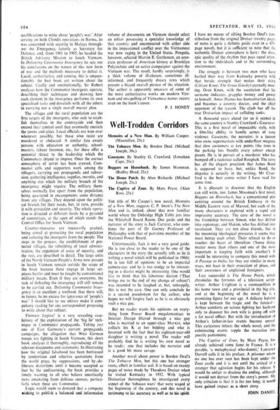The Thompson Gun
Vietnam. Edited by Marvin E. Gettleman. (Pen- guin Special, 8s. 6d.)
'PEOPLE'S war' or 'people's liberation war' are the Communist names applied to a novel form of warfare which first made its appearance after the Second World War. Some of its successes have been striking, as in China and French Indochina, yet it has suffered defeat as well in, for example, Malaya and the Philippines. For a long time many professional soldiers dismissed it as banditry or guerrilla warfare, totally failing to appreciate its true nature. Some of its fore- most practitioners, men like Mao Tse-tung, Vo Nguyen Giap and Truong Chinh, have written about it at length, but in terms too imprecise and cliche-ridden to serve as comprehensive guides.
The present war in South Vietnam finally convinced even the most diehard sceptics that this really is a new type of war in its own right, but the results of that acceptance have not been encouraging. Though a few serious attempts to analyse 'people's war' have been made, the bulk of the writing about it is the work of self-appointed experts without military ex- perience or a knowledge of the countries in which such warfare has been waged. Conse- quently, a great deal of what has been written about 'people's war' up to the present time has little worth.
Few, if any, can rival Sir Robert Thompson's
qualifications to write about 'people's, war.' After serving on both Chindit operations in Burma, he was concerned with security in Malaya through- out the Emergency, latterly as Secretary for Defence, and, from 1961 to 1965, he headed the British Advisory Mission to South Vietnam. In Defeating Communist Insurgency he sets out his conclusions on the nature of this new form of war and the methods necessary to defeat it. Lucid, authoritative, and concise, this is unques- tionably the best book yet written about the subject. Coolly and unemotionally, Sir. Robert analyses how the Communist insurgents operate, describing their techniques and showing how each element in the insurgency performs its own specialised tasks and dovetails with all the others in carrying out a single overall master plan.
The villages and the rural population are the first targets of the insurgents, who seek to estab- lish themselves in the countryside and then extend their control until they eventually encircle the towns and cities. Local officials are won over whenever possible, but those who resist are murdered or abducted. A similar fate awaits persons with education or authority, school- masters, labour foremen, etc., for these offer a potential threat to the leadership which the Communists intend to impose. Once the correct atmosphere of terror has been created, Com- munist cells and supporters work among the villagers, carrying out propaganda and subver- sion, gathering intelligence, supplies, recruits, and anything else which the military branch of the insurgency might require. The military them- selves normally live apart from the population, being quartered in encampments some distance from any villages. They depend upon the politi- cal branch for their needs, but, in turn, provide it with protection and security. The whole opera- tion is directed at different levels by a pyramid of committees, at the apex of which stands the Central Office for South Vietnam.
Counter-measures are necessarily gradual, being aimed at protecting the rural population and isolating the insurgents from the people. The steps in the process, the establishment of pro- tected villages, the rebuilding of local adminis- tration, the expansion of areas of security, and the rest, are described in detail. The large units of the North Vietnam People's Army now present in South Vietnam remain outside the scope of the book because these engage in large set- pieces battles and must be fought by conventional military means. Even if they are overcome, the task of defeating the insurgency will still remain to be carried out. Defeating Communist Insur- gency is so excellent a textbook that there will, in future, be no excuse for ignorance of 'people's war.' I should like to see editors make it com- pulsory reading for any correspondent proposing to write about that subject.
Vietnam Legion? is a very revealing case- history of the exploitation of the 'big lie' tech- nique in Communist propaganda. Taking just one of East Germany's current propaganda campaigns, the allegation that West German troops are fighting in South Vietnam, this short book analyses it thoroughly, reproducing all the relevant documents and statements. In illustrating how the original falsehood has been buttressed by tendentious and selective quotations from the world press, by suppressions, and by -de- liberate distortions until it became accepted as fact by the undiscerning, the book provides a timely warning to all who believe uncritically news emanating from dubious sources, particu- larly when these are Communist.
Logic would seem to demand that a company wishing to publish a balanced and informative volume of documents on Vietnam should select an editor possessing a specialist knowledge of that country and unconnected with either side in the impassioned conflict over the Vietnamese war now raging in the United States. Penguin, however, selected Marvin E. Gettleman, an asso- ciate professor of American history at Brooklyn Polytechnic and an active campaigner against the Vietnam war. The result, hardly surprisingly, is a thick volume of ill-chosen, sometimes ill- informed, and frequently dreary texts which present a biased overall picture of the situation. The author is apparently unaware of some of the most authoritative works on modern Viet- nam and misspelling of Vietnamese names occurs even on the book's cover.
P. J. HONEY



































 Previous page
Previous page